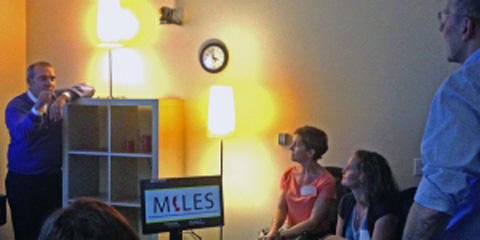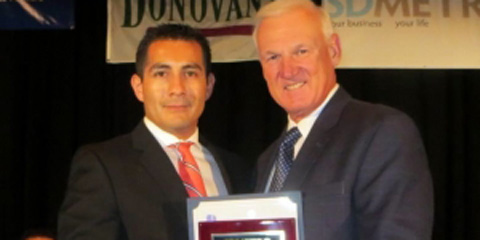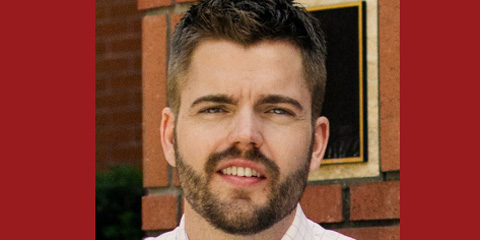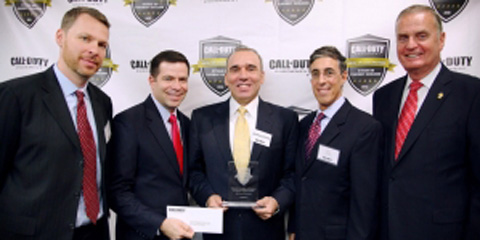News Archive
-
USC School of Social Work post-doctoral fellow, Erin Kelly, has received a two-year $100,000 award from the highly competitive Friends of The Semel Institute Scholar Program at the University of California, Los Angeles. The award is granted to fellows and junior faculty to support their research efforts in advancing treatment interventions for mental illness. Kelly was one of three scholars out of 44 applicants to receive the award.
-

Most national militaries have challenging basic training programs to ensure new members' physical fitness. Few, however, devote as much time to mental health.
And that may come as a detriment. A growing body of research suggests that targeted mental health training lessens the likelihood of later showing symptoms of post-traumatic stress and depression, or of sleep and substance problems for active duty service members and veterans.
-

Omar Lopez, clinical assistant professor in field education at the USC School of Social Work, has been recognized by San Diego Metro magazine with one of its 2013 40 Under 40 Awards, which annually honors the best and brightest minds in the area.
Lopez was chosen from a record 115 nominations and said the distinction of the award added to its personal significance.
-

Eighteen and pregnant, Jessica Chandler was terrified. Taken away from her mentally ill mother and placed into the foster care system as a child, she wanted to be a good parent.
"But I didn't really know what that meant," said Chandler, now a graduate student at Cal State Northridge.
Although she got help from programs that taught her about child rearing, two of her sisters were less fortunate. They struggled with parenting and lost their children to the same system that once claimed them.
-
A social worker listens to a client talk about what’s on her mind. The client, an elderly woman who lives on her own and has several chronic illnesses, is very depressed and has trouble managing her daily life. The social worker talks the client through these problems, helping her find ways to manage her various doctor appointments and medications, as well as how to improve her mood so she can better tackle day-to-day tasks.
Sounds like any normal counseling session, but it’s not.
-

Alma Fowlkes, MSW ’65, may have retired from the Los Angeles County Department of Children and Family Services in 1993, but she has never stopped doing social work over the last 20 years. A committed volunteer for the California Social Welfare Archives (CSWA) at the USC School of Social Work, Fowlkes was recently honored by the USC Alumni Association with the USC Widney Alumni House Award, which recognizes outstanding sustained volunteer service and contributions to the Trojan Family.
-

Marilyn Flynn, dean of the USC School of Social Work, presented the inaugural Dean’s Service Awards at the school’s Board of Councilors annual meeting, which was held in Los Angeles from Oct. 11 to 13.
The awards recognize those who have provided extraordinary acts of service in support of the school. This year’s honorees were:
-

Social workers do not typically rub elbows with Hollywood executives and personalities, but USC School of Social Work Assistant Professor Jeremy Goldbach did just that this fall when he received an invitation to join a panel of mental health professionals and artists from the entertainment industry. “Mental Health Goes to Hollywood” was aimed at bringing awareness to the industry concerning issues related to stigma in mental health.
-

The USC Center for Innovation and Research on Veterans & Military Families (CIR) was one of seven organizations to be awarded the inaugural Seal of Distinction by the Call of Duty Endowment Thursday for its efforts at helping transitioning veterans gain meaningful employment.
The Seal of Distinction comes with a $30,000 unrestricted grant and potential for larger grants by the endowment.
-

USC recently launched a new campus program, Trojan Guardian Scholars, to provide guidance to USC students who have previously been in foster care.
“We provide advice and guidance with regard to financial aid and academics, peer group support via a student organization, social events and assistance with campus life including housing options during breaks,” said Wendy B. Smith, clinical associate professor and associate dean for faculty development at the USC School of Social Work.